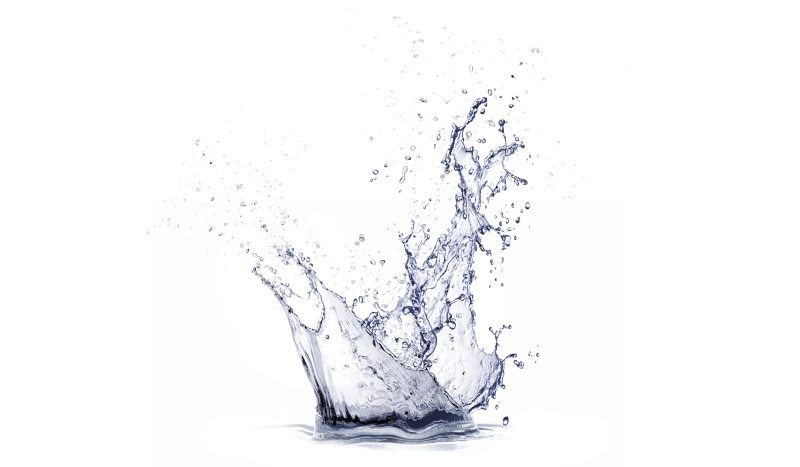
The Benefits of Water
With water being such a large part of our body mass, making sure you keep water as an integral part of your lifestyle is part common sense and part essential! Get some basic tips on why it's so important on a daily basis.
Water is one critical substance for our body as it helps with the proper function of all our organs and our body in general. Therefore we need to ensure we get enough each day. Around 50-60% of our total body weight comprises of water.
So Why is Water Important?
So what does water do? As well as enabling your organs to work properly, water helps your body to flush out all the toxins, to help you regulate your body temperature, to help get the right nutrients to all your body cells.
As your skin is the largest organ in the body, water is essential for it to maintain its moisture, flexibility and function. Without water you can expect to see dry and wrinkly skin as well it losing its youthful appearance.
Did you know that water is also very useful for weight loss. As well as being zero calories, drinking water helps to fill you up meaning your intake of calorific food will be less. Secondly, there is also some evidence from 2006 that drinking very cold water can actually help you burn calories (see links below) for around an hour.
How Much Should I Aim to Drink?
There are varying reports of how much water you shoudl drink from 6 glasses to 10 glasses. It does of course depend on how big the glass is in the first place! Ideally men shoudl drink around 3 litres of water a day whilst women shoudl aim for 2.2 litres (figures from Institute of Medicine).
The most important thing to note here is that this amount of water intake includes milk, juices and tea. This means it is not quite so daunting a task for most!
What about Deyhdration?
If you don't have enough water, then you can become dehydrated. Dehydration can be fatal and can occur if water levels in the body drop by just 9-12%.
In addition, as we saw above, water is essential for many of the body's prcesses and this includes your blood! Your red blood cells carry oxygen to organs and muscles in the bloodstream and your blood plasma consists primarily of water.
Blood is very specialised as a fluid and has 4 key components:
- plasma
- red blood cells
- white blood cells
- platelets
Blood plasma is also used to transport nutrients, glucose, fatty acids and amino acids. Blood is also used for removing waste products such as carbon dioxide from your muscles and for regulating your body temperature. So water is essential for your blood to function in all these ways.
Water, Sweat & Lost Fluids
Sweating is your body's natural way to regulate temperature and prevent your core body temperature from exceeding healthy levels. If your core temperature increases by just 1C, your athletic performance drops significantly.
During exercise, it is not unusual to expect to lose fluids at a rate of around 1-2% per hour. Thirst ensues following periods of dehydration and urine is a good indicator of these levels as clear urine depicts good hydration levels whilst dark urine suggests dehydration.
When we exercise, we sweat, losing sodium. It is more important however that we replace lost fluids rather than worrying about lost electrolytes. Drinking more than we might think we need to often helps to maintain hydration levels as we may feel less thirsty than our hydration levels may suggest.
By replacing lost fluids during exercise, it is possible to increase stamina, endurance and cardiovascular function. Lactic acid is removed more effectively and efficiently and the regulation of temperature and endurance levels will tend to be much more sustainable. It is a good idea to drink little and often.
Sometimes isotonic drinks are better for prolonged performance than just drinking water alone. This helps to replace lost blood glucoses and electrolytes. Thirst is the key indicator of dehydration. As combined with a healthy diet and regular physical activity, the amount we drink can play a vital role in determining our state of health and appearance.
Further Reading
Journal of Clinical Endocrinology & Metabolism - http://www.ncbi.nlm.nih.gov/pubmed/16822824
Most Popular
- › Weightwatchers Review
- › Diet & Nutrition Tips & Advice
- › Personal Training Workouts
- › Cholesterol Levels - High & Low - Explained
- › Detox for Weight Management
- › Home Gyms for Exercising
- › Best Gym Equipment for Weight Loss
- › Fat Burning Exercises
- › Body Conditioning through Exercise
- › Slimming Guides & Articles
You may also be interested in...
Water Workouts
Get wet and find out about swim workouts and the ways to get fit in the water. From aquarobics to injury rehab this is a fantastic low stress route to exercise.Blood Group Diet
The Blood Group Diet Plan is the invention of naturopath, Dr Peter D’Adamo. Different diets depending on which blood type you are. Does it work? Is it fiction?Cholesterol Levels Explained
Be aware of your cholesterol levels! Do you know what's good abotu low levels and bad about high levels? We've explained it all in as simple a way as we can.Body Conditioning Through Exercise
Find out about ways to get body conditioning into your workout plans. Exercise will help you tone as well as condition your body and is a key route to long term weight loss.Mind and Body Classes
Find out more about body and mind classes and how exercising in this way can help motivate you to further weight loss and slimming.
